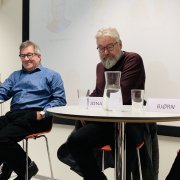Meet the mentors
Read the questions and answers from when the students at Ullern Upper Secondary School met their mentors for the very first time.
In the middle of October, 32 students at the researcher program at Ullern Upper Secondary School got to meet their four mentors for the next year. After a short introduction, there were many questions from the students to the mentors. It took an hour and a half before their curiosity settled down and it was time for pizza.
Simone Mester: “I am a former student of Ullern Upper Secondary School and now I am doing a PhD in molecular biology. In the long term, I could imagine working in the private sector developing pharmaceuticals.”
Øyvind Kongstun Arnesen: “I am a doctor and worked many years in Lofoten. After that, I worked some years as a surgeon in an emergency room, before I began working for a large German pharmaceutical company called Boehringer Ingelheim. Eight years ago, I became CEO for Ultimovacs. Ultimovacs are trying to develop the worlds first cancer vaccine.”
Jónas Einarsson: “I am a doctor, and did the first part of my medical degree on Iceland, because my grades weren’t the best. Then, I worked many years as a general practitioner in Lardal, before moving to Oslo and becoming the manager of the first private hospital in Norway. In parallel with this, I did a degree in economy and management at BI. Finally, I became the CEO of Radforsk, who among other things, initiated the Oslo Cancer Cluster Innovation Park and this school collaboration.”
Bjørn Klem: Bjørn is the fourth mentor, but he was unfortunately ill during the first meeting. Janne Nestvold, Laboratory Manager at Oslo Cancer Cluster Incubator, came in his place. Nestvold has a PhD and has worked as a researcher for many years.
After the introductions, the teachers at the researcher program, Ragni Fet and Monica Flydal Jenstad held a short presentation of the upcoming work with the mentors.
Then, there were several questions from the audience. We were really impressed by the amount and quality of the questions, that concerned both education, job opportunities and, research and development, which both Kongstun and Mester are a part of. The questions rained down and the answers came in a session that continued for over an hour and a half. You can read some of them below. Then it was time for some pizza and mingle.
The next time the students and the mentors will meet will be in the beginning of December. The students will meet in the mentors’ workplaces and see with their own eyes what they do on an everyday basis.
Questions and answers:
What kind of medical specialisation does Jónas and Øyvind have?
“We are both general practitioners and have not specialised. You do not have to.”
What kinds of jobs can you do after you are finished, Simone?
Simone: “I can do a postdoc to become a researcher in academia. I am still a student while I am doing my PhD, but I receive a salary. It is normal to do two postdocs, then you can become group leader or professor. I don’t think I will follow that route, I would much rather work in a private company or start something myself. I think that seems more exciting.”
Jónas: “Simone will get a job immediately in one of our companies if she wants it.”
Are there many developments every day to find a cancer vaccine?
Jónas: “It takes time, so the short answer is no.”
What is the greatest challenge with the cancer vaccine that Ultimovacs are developing?
Øyvind: “To make it work? A good and difficult question.”
Øyvind explained further about the development and testing of the vaccine at Ultimovacs.
What is your PhD about, Simone?
Simone: “I develop technology that prolongs the half-life of medicines. It is a patient-focused PhD, since it is a big inconvenience for the patient to take medicines often, but I hope we can succeed in prolonging the half-life so that patients can take the medicine once a week or once a month.”
What should one study if one wants to work with medical development or pharmaceutical development?
Jónas: “Molecular biology, physiology, IT, physics, chemistry, biology, statistics – there are many opportunities.”
Øyvind: “In our company, we have physiologists, doctors, protein chemists, dentists and pharmacists working right now.”
When you went to upper secondary school, did you know that you would be doing what you do today?
Jónas: “I chose the natural science, but did not know anything else.”
Øyvind: “I only knew I wanted to study natural science.”
Simone: “I was thinking about studying a medical degree, but I am happy that I chose molecular biology.”
Janne: “I thought about becoming a researcher and thought it seemed exciting. You should absolutely think widely and not just the easiest solution when you are still in upper secondary school. You will benefit from that when you begin to study at university.”
Have you always been interested in biology, or was there something special you saw that made you excited about it?
Jónas: “Yes, always.”
Øyvind: “Biology in itself is very fascinating. There is so much we do not know, like where memories are stored in the brain, for example. We know very little about how the body works, so that is very fascinating.”
The cancer vaccine you are developing, will it work against all cancers or only specific types of cancer?
Øyvind: “It will work to treat and protect against most cancer types.”
What did Bjørn do in PhotoCure, the company he worked for before becoming manager for Oslo Cancer Cluster Incubator?
Jónas: “He was Head of Research. He is a very smart guy, and he has also worked a lot with the regulatory side.”










